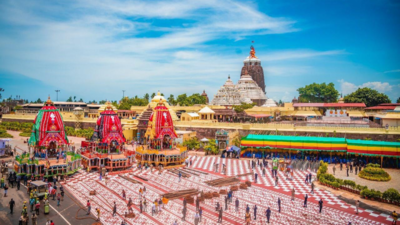Odisha Government Pushes for UNESCO Heritage Status for Puri Rath Yatra |

BHUBANESWAR: The Odisha govt has renewed its pursuit to obtain UNESCO Intangible Cultural Heritage of Humanity recognition for Puri’s Rath Yatra, which attracts over one million visitors annually.
The Shree Jagannath Temple Administration (SJTA) on Sunday confirmed their ongoing preparation of nomination documents for submission to the Sangeet Natak Akademi, the designated nodal agency for ICH proposal assessments.
Although the state culture department had initiated an attempt and formed an advisory committee in November 2022 to submit a UNESCO nomination for including Rath Yatra in its intangible cultural heritage list, no submission was made at that time. SJTA’s chief administrator Arabinda Padhee recently discussed with Union Ministry of Culture officials in Delhi to secure their support for this initiative.
“The chariot festival, a cornerstone of Odisha’s revered 12th-century shrine, embodies the rich cultural heritage of India and deserves global recognition,” the SJTA chief administrator Arabinda Padhee said. He emphasised that this initiative underscores the significance of Rath Yatra in India’s cultural and historical framework.
“We will send the proposal in the next few days. Our discussions with the Ministry officials were positive,” he said. The administration anticipates that this distinguished recognition would honour the festival’s legacy while presenting India’s varied cultural and religious traditions to the world.
The Rath Yatra draws countless devotees from across the globe to Puri every year. A unique aspect of the festival permits Lord Jagannath and his siblings – Lord Balabhadra and Devi Subhadra – to leave their sanctum sanctorum yearly, allowing darshan for followers of different faiths.
“The festival maintains its traditional essence despite contemporary influences and modernity. The exceptional craftsmanship displayed in iconic chariot construction remains a notable aspect. UNESCO recognition would help promote this living heritage globally while strengthening community bonds,” Arabinda Padhee said.
Records indicate that Mayurbhanj district’s Chhau dance received UNESCO Intangible Cultural Heritage status in 2010. UNESCO’s representative list of Intangible Cultural Heritage of Humanity includes elements that demonstrate heritage diversity and highlight its importance. Countries submit nominations according to specific criteria, evaluated yearly by an intergovernmental committee.
















